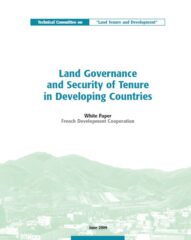
White Paper – French Development Cooperation
Land tenure is a social construct, based on the relationships people establish in order to gain access to land and natural resources. As such, it has major economic, social and political implications.
Land policies play a key role in development strategies because they define land rights and their management, and the rules governing land allocation. The debate about policy options raises numerous questions: Should the development of land markets be encouraged? How should local land rights be dealt with? Can economic growth be combined with equitable access to land and environmental protection?
Developing countries need forms of land governance that take account of their diverse social, political and institutional situations in order to enable them to deal with the unprecedented challenges now facing them.
Mechanisms for securing land tenure that recognise the wide range of rights and sources of legitimacy can provide the basis for equitable and sustainable economic development. Promoting such mechanisms often involves redefining the role of the public authorities in order to regulate competition between different actors over access to land.
International development agencies need to support the land policies being debated at the national level by actors from the public and private sectors and civil society. This should be done in accordance with the Paris declaration, and bearing in mind the history of each country, thereby helping to promote democratic land governance.
This is the message from the development practitioners that have been working on land tenure in association with the Land tenure and development committee, and their proposed strategy for the French Cooperation.
